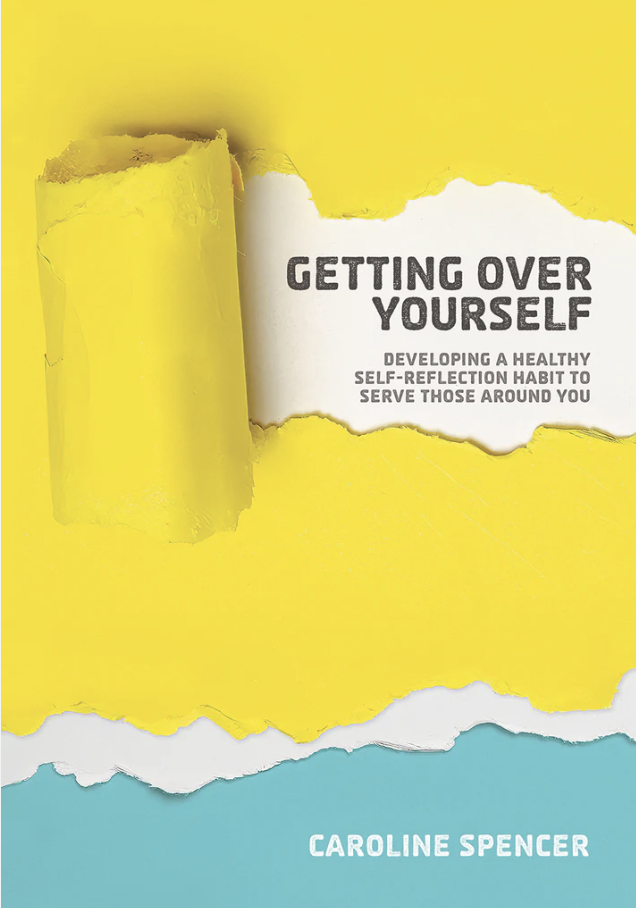Caroline Spencer helps anyone seeking to communicate better to develop self-awareness in her excellent book ’Getting Over Yourself: Developing a Healthy Self-Reflection Habit to Serve those Around You’ [1]. Ministry practitioners will be especially helped. This book will give you the tools to understand yourself better so that you understand why certain people are emotionally triggering to you and why you might trigger others. You might think you are already self-reflective, but is your self-reflection “healthy”? Is it a habit? Also, most importantly, does it serve those around you?
In life and in ministry, our reactions reflect our deep convictions. Often those convictions are good, biblical and life-giving, but sometimes they are unexamined and harmful to those around us. God encourages his people to examine themselves and aim to become more like Christ. We prayerfully change—we get over ourselves—by seeking to more closely imitate Jesus the servant. But how do we explore our hearts and lives without drifting into self-absorption? What situations could benefit the most from a time of reflection? How can we ensure we have good self-reflection habits? In Getting Over Yourself, Caroline Spencer answers these questions and others as she provides a model for healthy Christian self-reflection.
Motivation for change
The book has three parts. Part 1 gives the case for self-reflection and its importance in the Christian life. It positions self-reflection as an act of service to others:
The Christian life is about change as we seek to imitate Jesus.
Take Ephesians 4:31-5:2 for example:
Get rid of all bitterness…forgiving each other…Follow God’s example, and…live in the way of love, just as Christ loved us and gave himself up for us as a fragrant offering and sacrifice…
If we are to take walking “in the way of love” to heart, this will mean:
-
- Becoming aware of…[the] presence of bitterness and the absence of forgiveness…
- Taking responsibility for these things…
- knowing…the motivation for change…is Jesus himself…
- changing- repenting where required…
- taking that learning into the future because we want to walk more…in the way of love (p. 14)
4 Steps for Analysis
Part 2 introduces a 4-Step Model for analysing things that happen to us. Step 1: Describe what happened; Step 2: Explore what was going on for you; Step 3: Identify the opportunities for growth; Step 4: Enact it by putting it into practice.
Step 1 can be complicated when our emotions are involved. Caroline recommends making a “frame-by-frame” construction of events first and foremost. This section provides the example of “Phil” and his fictional encounter with “James” (p. 41).
Step 2 is recognising the emotions we felt during the event. “Becoming more skilled in correctly noticing and naming our emotions will give our self-reflection some helpful information and direction” (p. 41). Step 3 can be confronting because it identifies areas we could have handled things better, but Step 4 can help us redeem the encounter by putting our lessons into practise in the future.
Self Reflection Toolkit
Part three of Getting Over Yourself provides a whole health self-reflection toolkit, which includes blank worksheets for group reflection and personal values reflection. Caroline’s book is wider so that you write your self-reflections in the toolkits. She’s even included a QR code for you to download and print another copy if you want to do it again.
One of the included tables in Part 3 unpacks the 4-step model from Part 2 in greater detail. Here she provides a much richer explanation of how to do each step. For example, the frame-by-frame reconstruction includes remembering “who said what, when…the emotions, attitudes and feelings, subconscious reactions” (p. 63.)
In Step 3 of this Model, when we are meant to identify opportunities for growth, she asks us to remember:
What biblical concepts or teachings are applicable here? What biblically informed personal values should be at play? Where is the opportunity for growth? How can I “see the good” and turn this into a positive learning experience? (p. 63).
The Power of Reflecting on Personal Values
When I first read this book, I glossed over the personal values section part of the toolkit (pp. 83-91) with its alphabetised checklist and rating scale starting at “adventure”, going through to “wisdom.” It was kind of daunting after tackling the other tables. However, as I read through the list of values, I started to realise how crucial this section was for handling my frustration over a conflict that had happened to me recently.
I was processing the frustration on repeat in counselling or with a chaplain without a sense of resolution or peace for months. The personal values checklist helped me realize that I was frustrated because I highly value “kindness” which Caroline defines as “being generous and considerate to others” (p. 87). Identifying this personal value helped me process my frustration and understand why the event stayed with me for so long.
Some Christians might find the term “personal values” unfamiliar or uncomfortable. They may prefer to work through other biblical “virtue lists like Galatians 5:22-23…” Personal values can still be Christian, even if the language isn’t directly from the Bible, as personal values can be “shaped by one’s knowledge of God and by other factors like social environments” (p. 83).
Just like when engaged couples examine their “family of origin” (another term used by Bowen) to understand how their family habits and behaviours’ differ from the person they are marrying, understanding your own values may help you understand why you continue to get frustrated in some work, church or family relationships.
Critiques
There’s been a lot of Family Systems/Bowen theory inspired books written over the last decade such as Growing Yourself Up by Jenny Brown and Family Systems and Congregational Life by Bob Creech. Caroline’s book brings the family systems energy without getting bogged down in terminology and explanations. It’s easy to read and the reflection tables are excellent, but it may turn off some people who prefer to just read about the principles and don’t want to pick up their pencil and do the work in a book.
This book is a helpful tool for pastors, leaders, and lay leaders serving in their churches, but it’s also something Christian workers with complex jobs or management responsibilities will find very useful. I am better at hearing the underlying anxiety from my staff and communicate much more clearly under pressure.
Although I loved this book’s brevity and simplicity, I would have loved more examples. This kind of self-reflection is deeply personal, but anonymised or modified stories help to embody principles into practise. I would enjoy a second book that had a lot of case studies and examples for application.
Caroline takes the mystery out of self-reflection without having to navigate theoretical complexity. Getting Over Yourself helps us to see why self-reflection is biblical, necessary for the normal Christian life, and gives wide enough margins to get it done. Thankyou, Caroline.
[1] Caroline and I met in 2020, we have been talking about her new book for six years. Getting over Yourself is slim (barely 95 pages) and wider than most paperbacks to accommodate detailed reader reflection tables. This book will make readers reflect and ponder their ministry and communication practices in ways they would have otherwise avoided. There is plenty of space to fill in your responses in the tables throughout the book to aid that task.
If you aren’t familiar with Bowen’s Family Systems, it’s a type of connected thinking about relationships in families, friend circles, churches, and work. The Family Systems Institute (FSI), which is an Australian Institute devoted to applying Bowen theory to ministry and other relationships, has heavily influenced Caroline’s approach to ministry and other relationships. His method is a range of tools for managing what he called “anxiety” in relationships. Bowen wanted people to become aware of how their behaviour led to conflict with others. He didn’t believe in avoiding conflict, but in teaching people to handle it better.
















